#grishaverse meta
Text
Alina loving her powers would mean for her to love herself. Whenever she loves her light, the way it makes her feel, the way it protects her, she is loving who she is and defying the will of an oppressive society that wants her to hate herself. She was meant for another story where the author doesn’t chastise her for loving herself and create a bizarre message that if you love yourself too much, you need to be humbled and put in your place.
Shadow and bone glorifies repression in a disturbing way. It almost seems to praise Alina’s repression during her adolescence as an accomplishment that eventually allowed her to defeat the Darkling and proof of her humility. In RoW, she condemns her supposed greed in the past in an act of self-flagellation because OBVIOUSLY she must perform her humility to prove that losing her powers wasn’t a horrible thing. This self-hatred is then transformed into condemnations of the Darkling and reveals her (and the narrative’s) fear that she will become like him. It’s almost hilarious how scared the story is of Alina potentially understanding him and sympathizing with his ambitions.
That’s ultimately the great fear of the story. That Alina will care enough about something to actually use her power to change the status quo and help other people aside from Mal. That she will embrace who she truly is and become active in her life. Taking responsibility and stepping up to the challenge is wrong and evil, so she should just sit down and quietly hate herself while the problem gets worse
#shadow and bone#the darkling#lb critical#alina starkov#s&b critical#s&b salt#aleksander morovoza#anti leigh bardugo#darklina#grishaverse meta#s&b netflix
117 notes
·
View notes
Text
Was the Darkling that much of a liar as the fandom makes him to be?
Because it's literally one thing for a character to truly lie every other page and another for the reader to have been tricked by the narrative that he's a compulsive liar.
If we thoroughly search and find his lying moments in the Grisha trilogy then it would be these:
“I don’t want to answer you.”
“Oh.”
Then he sighed and said, “One hundred and twenty. Give or take.”
After a moment, the Darkling said, “My great-great-great-grandfather was the Black Heretic, the Darkling who created the Shadow Fold.”
“How?” I pleaded. “How am I supposed to do that?”
“By helping me destroy the Shadow Fold.”
“What’s Baghra’s power, anyway?”
“I’m not sure,” he said. “I think she was a Tidemaker.”
“Because every day we don’t find the sea whip, I’ll peel away a piece of her skin. Slowly. Then Ivan will heal her, and the next day, we’ll do it all over again.”
“Where are they? ” I screamed.
“They are safe. For now. They will be on my skiff when I enter the Fold again.”
“As hostages,” I said dully.
He nodded.
So in the whole trilogy the Darkling lied six times. Four if you count the scenes before he was revealed as the "evil guy".
His first real conversation with Alina is considered both by the protagonist and the fandom as manipulative and shady. He lied about his identity, age and true goal. Now let's take it from the beginning.
The fact that he lied about his age and identity wasn't something personal against Alina. This is the exact same lie he had been telling the world for four hundred years as a means of survival and staying as head of the Grisha. Also, did we really expect him to say "Yeah, I was the one who created the Fold. Hehe what can you do?☺️". We would be lying too if we were in his place.
Another thing that needs to be understood here is that the Darkling was testing her. He was trying to see what her personality is like, how does she feel about her newfound powers and, most importantly, what has she heard and how does she feel about him. I'm pretty sure that he was kinda sure that Alina would have been influenced by the people's views about him. And he was right. Alina was afraid of him thanks to the rumors and superstitions that surround him. If she also knew who he truly was then she would run from that barn ASAP.
Now let's see the next lie that the Darkling spat out. The one where he told her that he needs her to destroy the Fold. This was another test. Trying to see how she would react if she knew her true purpose as the Sun Summoner that everybody expected.
Apparently she failed that test as well:
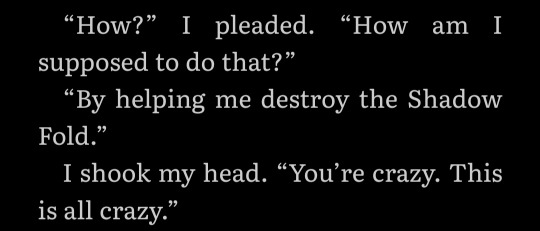
Alina panicked when she heard that the realm's future lies on her shoulders, when she understood that she would be the one to destroy the Shadow Fold. Imagine how she would react if the Darkling said "Okay look. I need you so I can use the Fold against some nations, not destroy it". Yup, she would scream and run.
There's no way the Darkling would say the truth to her, especially since he saw how frightened and prejudiced she was about him and how clueless she was about the whole economical and political situation Ravka was at this point.
He was waiting for the Sun Summoner to be born and emerge for centuries. He would never risk losing her now because of her narrow views and some brutal truths. It was a matter of life and death for him in order to protect his country. And this girl was too young, too naive to understand.
So no. He didn't do it because he had something personal against her or to seduce her. He did it for the good of his country so this girl would stay no matter what.
Sadly, it's evident that in the end the Darkling's suspicions proved to be right. She run away. And when he found her he chastised her about her selfishness and her inability to see the bigger picture.
“Did you deserve my trust? Baghra whispers a few accusations in your ear, and off you go. Did you ever stop to think of what it would mean for me, for all of Ravka, if you just disappeared?”
“You didn’t give me much choice.”
“Of course you had a choice. And you chose to turn your back on your country, on everything that you are.”
“That isn’t fair.”
“Fairness!” he laughed. “Still she talks of fairness. What does fairness have to do with any of this? The people curse my name and pray for you, but you’re the one who was ready to abandon them. I’m the one who will give them power over their enemies. I’m the one who will free them from the tyranny of the King.”
The Darkling was right, she did have a choice. I once heard a line from a show that said "In life we always have a choice. But sometimes it's easier to think that you don't" and it applies to Alina here perfectly. She had a choice but she said to herself that she didn't. And by doing so, she only proved Aleksander right. She can't handle the truth.
Now the next lie is when he lied about his mother's powers. Don't have to dwell here because it's the same thing as before. It's the same lie he tells everyone "I don't know. I'm not sure". The Darkling (publicly) has distanced himself from his mother and keeps that relationship a secret. It's just part of his persona (just like his age, his identity etc.). Again nothing personal against Alina.
The next one is just some clever emotional manipulation. When he made clear to Mal that he would curve Alina's skin he knew that the threat was just enough. He has seen them act all cutie-cutie and being sacrificial for the sake of each other to a disgusting point so he took advantage of that (I say good for him).
And the last one is just my personal favourite if you ask me. That strategy he displayed there was my most favourite that he ever showed. Since he knew again how the threat would be enough for Alina to come to him like fish on a bait. He embraced his villainous persona and pretended that he would hurt those children if she didn't surrender to him. But he knew better. Mindless heroism would just bring her right into his net and again he was proved right until everything fucked up and died.
In his own words:
“I know what you thought, what you’ve always thought of me. It’s so much easier that way, isn’t it? To puff yourself up with your own righteousness.”
Just some delicious shit actually.
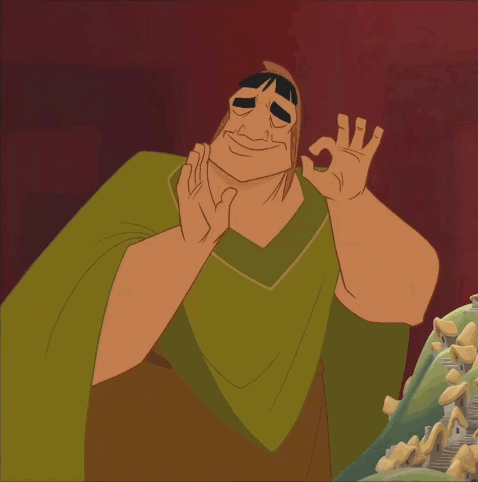
So, in conclusion, no. He wasn't a compulsive liar. But when he needed to lie he did and only for (as he saw it) selfless reasons. In fact, he mostly either evaded the truth or spoke truth. So misinformation just spilled that man's reputation lmao.
#i just wanted to clear some things and wipe my boy's reputation clean#because apparently people shit on the Darkling who *stayed* for his people but glorify Alina who abandoned everyone#priorities show a lot my loves#and I love Alina but the fandom generally forgets that she was a human with many flaws (one of the reasons that I like her actually)#the darkling#the darkling meta#meta#shadow and bone meta#grishaverse meta#shadow and bone#ruin and rising#siege and storm#pro darkling#aleksander morozova#pro aleksander morozova#grishaverse#grishaverse trilogy#alina starkov#anti mal oretsev#anti mal#anti malina#baghra morozova
88 notes
·
View notes
Text
it's interesting how everyone sort of acknowledges that the druskelle are a cult, but no one really acknowledges that the Little Palace is more or less the same thing (except possibly worse, since Ravkan Grisha have no say in whether they get taken to the Little Palace and military service is compulsory for them)
we just largely don't think so because we see the Little Palace situation primarily from the perspective of the insiders, who have no real reason to perceive their situation as bad except for Alina (who's stuck fleeing from the cult leader for two books but sees her situation as interpersonal rather than systemic), as opposed to the druskelle, which we see principally from the perspective of outsiders and Matthias, an ex-druskelle who quickly becomes an outsider
#grishaverse#shadow and bone#six of crows#alina starkov#soc meta#grishaverse meta#thinking about Nina and Jesper and their canon perspectives on living in Ravka rn
125 notes
·
View notes
Note
🌶️, Grishaverse?
Despite claims to the contrary, Rule of Wolves did not assassinate the Darkling's character. He is completely consistent with how he was written in Shadow and Bone- a once bright young man turned noble demon, jaded so badly by the long eons of struggle and isolation that he can no longer see the world except through the lens of power and control. He cares nothing for anyone else's opinion, because that was the only way he could carve the future he wanted- if he shut himself off from the world- from pain, from loss, from doubt, from judgement, and in so doing he's made it impossible for him to truly be the one that saves the world, that remakes it.
The only reason people think he's been character assassinated in Rule of Wolves is because Bardugo writes him consistently with how he is in Shadow and Bone, rather then the version his stans would imagine him as as- edgy, misunderstood and only in need of love to 'fix' him. But at the core, the Grishaverse is not a series that believe love will fix you. Love is a choice, an act, and a promise in Bardugo's world- not a cure all, or hidden power, or a talisman. Zoya's story in Rule of Wolves, ironically, hammers this point dead home. What Zoya realizes at the novel's pivotal moment is that love is a labor- it requires you to be vulnerable, to work at it, to get up each day and decide to keep at it.
Love can't save the Darkling because he can not bring himself to choose love over power, because choosing love would mean having to honestly face himsel. He would have to open himself up to others, and to the idea that he was wrong in his actions. And so instead he cries that he has no regrets as he is impaled on the thorns, because he can't allow himself to have regrets. The boy who had regrets might have been one that found redemption, but he never would have survived the world of his youth. The man he is, ruthless and unyielding and unafraid, sees that neat simple line between point A (the world dying) and point B (the world not dying) and takes it without hesitation, even if it means an eternity of torment, refusing to be humbled or to repent, even as the universe demands he kneel.
#Grishaverse#Grishaverse meta#The Darkling#aleksander morozova#zoya nazyalensky#Rule of Wolves#The Spicy Take Zone#I might have strong feelings on this one since I read Demon in the Woods before any other Grishaverse piece#Rule of Wolves spoilers
65 notes
·
View notes
Text
Alina pushed her power down so that she could stay with Mal (when they were tested as children). She was only able to call her power on her own, in Baghra's hut, when she thought that her relationship with Mal was over, and she kinda lets him go (ch 12 s&b). And she felt healthy and happy when she used her power on her own for the first time.
And Mal always resents her power. And then to stay with him, she has to lose her power forever.
This is why I am not a malina stan.
#shadow and bone#Grishaverse reread#Shadow and bone reread#grishaverse meta#grishaverse#alina starkov#anti malina
136 notes
·
View notes
Text
The problem with S&B S2's magic system
(And why it weakens one of the best moments of the series)

Before I start, I just want to preface with the fact that I am talking about the show only here as it's own entity. I know that some of my complaints can be said of the books as well. However from S1, the show substantially altered the concept of amplifiers, so clearly they're not above making changes to the way the magic system when it suits them.
Diving right in to my analysis...
S1 for all its faults does a solid job of setting up the magic system within Ravka. The grisha orders are presented as being very strictly defined with no suggestion that there is any choice involved in a grisha’s sub-order.
(This is in contrast to the books where it is established as early as Alina’s carriage ride with Fedyor and Ivan that a grisha’s sub-order is more of a specialisation that they have some choice over.)
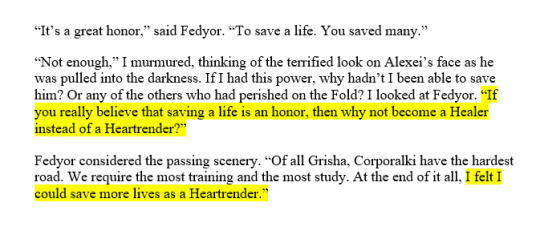
This strict delineation has consequences for the plot of S1.
In S1E3 we meet Genya and are given a fairly comprehensive overview of her powers. As a tailor, her main power is in modifying an individual’s appearance. This includes being able to mend surface level injuries.
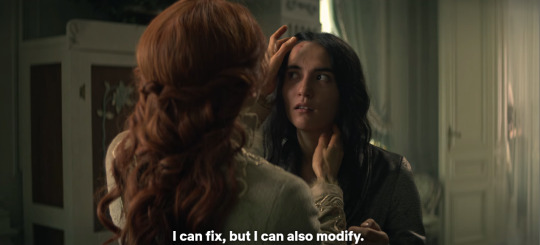
In S1E5 when Marie is attacked, Genya is unable to heal Marie’s wound and Marie subsequently dies. This in many ways is the trigger point for the whole second act of the first season. Marie’s death is what causes Aleksander to leave Alina alone in his War Room, and therefore what gives Baghra the opportunity to convince Alina to flee.
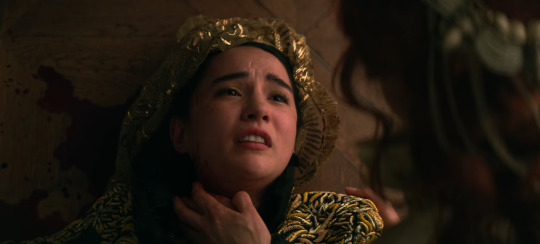
(The show then goes on to never mention Marie’s death again, but that’s a separate rant of mine.)
Genya not being a Healer (or at the very least, not knowing that she can heal) is important to the story of S1 and established concretely to the audience.
And then we have S2…
S2 makes the decision to expand on the magic system by blurring the line between the various orders. This is not necessarily a bad decision in its own right – many stories successfully add nuance to their magic systems as the audience grows familiar with how it works. However I would argue that the show does not manage to do this successfully.

We are first introduced to this change through Alina’s travels to Novyi Zem and aboard Nikolai’s ship. Characters like the librarian and Tamar tell us that other countries do not distinguish between grisha in the way that Ravka does. Which is fine in theory, except this is one of the many, many things that we are told and not shown.

None of the non-Ravkan grisha actually demonstrate any powers outside of their one specific sub-order. With the possible exception of Sankta Neyar who uses a form of blood-bending. However we are explicitly told that this is because there is iron in blood and not because she can control blood itself. Therefore her powers still fall neatly into what we might expect of Durasts.

So who doesn’t fit into a neat box…? You guessed it - Genya.
Genya gains all kind of powers this season. First of all is healing. In S2E4 Genya is able to easily heal Baghra’s broken wrist - something that goes well beyond Genya’s established powers in S1. The show could have possibly explained this by having Baghra amplify Genya, but that’s not what happens as Baghra doesn’t touch Genya while she’s working.

The fact that Genya has the capability to heal is not in itself a problem – given what the show clumsily tried to establish earlier in S2. However, the problem is that Genya should not know that she has these capabilities. Because she explicitly didn’t know about them in S1, and nothing has changed between the seasons to give her this information.
Now that we have all that established, let’s talk about the scene I referred to back at the start of this rant.

In S2E5 Genya and Baghra find Alina’s underground hideout. In one of the best scenes of the series David asks Genya how she managed to find them, to which Genya replies that she was able to follow David’s heartbeat with the help of Baghra’s amplification.
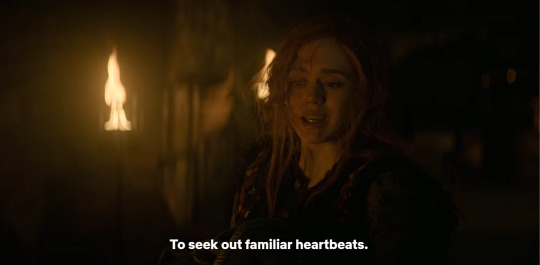
This is such a powerful moment due to Daisy and Luke’s fantastic acting, but it’s undermined by the writing. This reveal about Genya’s Heartrending should have been a great shock – to the audience and to Genya – a discovery of an unknown power that she was only able to tap into in her most desperate moment to find the love of her life.
But because we have already seen Genya’s unexplained ability to heal, this reveal instead comes across (at least to me) like Heartrending is a power that Genya has always known about, she merely forgot to mention it earlier in the show.
And so a fantastic acting performance is hampered by weak writing. It’s far from the only such moment (believe me, I could rant for hours about S2’s writing). But this one particularly frustrates me, because it would be so easy to fix! All the writers would have to do would have Genya not heal Baghra’s wrist, or have Genya only be able to heal Baghra’s wrist with the help of amplification.
(rant over. thanks for reading)
#shadow and bone meta#shadow and bone critical#grishaverse meta#genya safin#david kostyk#genya x david#anti sab#my meta#i have a lot of thoughts about s2#and very few of them are positive
71 notes
·
View notes
Text
Grishaverse rant: First Army.
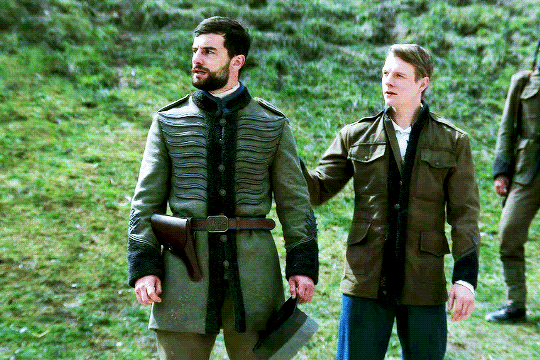
(Dominik the Bold in a field dress uniform and Sobachka in... an enlistment's uniform? Bubby, you're a major, what's up, Lapushka?)
Sometimes, now that I'm part of the Grishaverse fandom, I wish I was old enough to have been around when It first started. it's all great, but it's So big, sometimes I feel like I'm screaming into a void. Plus, since Leigh Bardugo is so big as an author, I can't just send her an ask anymore about the size of Ravka's armies, which has been a particularly meddlesome problem with regards to my fanfic I've been writing. With history being my major backbone to any work, I always love to situate my works in a period, and annoyingly, Ravka would work for Napoleonic Era Russia, which means I can haul out my giant Oxford History of Russia (on pdf), and go to work. But, the line of reality and fiction blurs, and as someone who's a very linear and realistic thinker... it's difficult. Especially with the Nikolai duology and the sudden leap from 1800 to... 1940ish with the usage of rockets which should more closely resemble V1/V2s then what I assumed - IBCMs.
“In the distance, I saw Os Alta, the Dream City, its spires white and jagged against the cloudless sky. But between us and the capital, arrayed in perfect military formation, stood row after row of armed men. Hundreds of soldiers of the First Army, maybe a thousand—infantry, cavalry, officers, and grunts. Sunlight glittered off the hilts of their swords, and their backs bristled with rifles.”
(hmmm). LB, where's the artillery?! Also why does no one in this book series wear helmets when going into combat??
Basically, I feel like LB should have put more energy into the makeup of First and Second Army. As a historian in training, where are the calvary beyond this one mention, where's the heavy and light artillery? She says regiments? Give me corps, give me battalions! where are the battle-honors, the Colors of regiments? I know First Army is stretched thin and they fight for the king, but I want regimental colors! I want Nikolai pouring over the regimental histories! Give me more than two Generals, Grishaverse wiki! Give me battle stories. Give me a history of regiments who're disbanded in times of peace and risen in times of war. We know Ravka has a draft and they're constantly in active border skirmishes with Fjerda/Shu Han, but I want to see the machinery and guts of a Ravka constantly in a state of ever-active militarism. Give me proper technological advancement by non-grisha, and for saint's sake, give me a reason why LB hasn't thought of this before Nikolai's Nolniki. It can't be Just Nikolai thinking of these things. Nor just Grisha hoarding all their tech!
#wyn rambles#military history#grishaverse#nikolai lantsov#grishaverse worldbuilding#grishaverse meta#SIGH#as a history nerd this is a crime#she's trying her best#shadow and bone
15 notes
·
View notes
Text
Alright Meta Post
My friend @chethaunts told me about a character from Critical Role, Percival de Rolo, who invented and wields the first gun in the CR universe. I asked "Who would win between him and Jesper." We agreed that Jesper would win because Jesper never misses, and then I got to thinking.
Jesper is overpowered and broken.
This is brilliant in terms of Grisha because Jesper is extremely unorthodox.
The Second Army is restrictive for Grisha, and by never joining the Second Army in-series, Jesper has more freedom. The Grisha have their orders and the colors they wear, but Jesper exists entirely without the structures of the second army. In the first trilogy, the Durasts and Alkemi didn't even fight on the front lines, being relegated to laboratories at the Little Palace. Jesper, a rouge Durast helps Wylan create a drill out of a diamond necklace. Jesper, a rouge Durast controls bullets with his mind. Grisha wouldn't even be an appropriate term at this point, as Jesper is free from the rigidity of the structure of the Second Army. He's not just a rouge Durast, he's zowa, blessed. Blessed by not being in the Second Army and all its restrictions. Jesper has incredible potential because he's free.
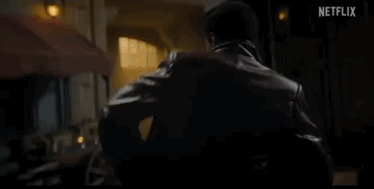
#grishaverse#jesper fahey#wesper#shadow and bone netflix#grishaverse shitpost#shadow and bone season 2#shadow and bone show#shadow and bone tv#shadow and bone s2#netflix shadow and bone#shadow and bone#wylan van eck#six of crows duology#six of crows#critical role#percy de rolo#percival de rolo#grishaverse meta#grishaverse theory#grisha orders#the grishaverse#comparison
83 notes
·
View notes
Text
If Nikolai didn't exist:
I love Nikolai but I think him being right there kinda took away some conflicts I would have loved in the story. He was such a convenient person for the throne.
It would have been interesting if with the civil war, the grisha rebelling against the darkling had the additional task of arranging their own coup. Instead of the Lantsovs vs Darkling in terms of who will get the throne, it would have been Alina (their most convenient option, even if it's actually Zoya or someone else ruling from the background, she would have to be the figurehead) vs the Darkling.
The grisha are fighting amongst each other and the king and apparat are pulling their own strings, calling their allies and what not to take both sides down while they are distracted and weakened, instigating the public, etc.
Nikolai was a good person, a good option for the throne as well as for the marriage of alliance. The Lantsov king was none of those. He also had disdain towards grisha and on hearing of the coup would definitely have preferred to turn them all into dust. So, even the winning side wouldn't be safe, no matter if they support him or not, he would not ally with them without trying to backstab them.
With Nikolai, Alina would have gotten the support of those who support the monarchy too, but without him, she would just have her cult (that too, the Apparat might try to mess with), and the relatively few people who see her as the lesser of all evils in the equation while still trusting her to be capable enough to not get them all killed and her side would have to make a lot more additional efforts for her to be accepted as queen and be seen as someone strong enough to not deliver them right on the pyre with her victory.
She would have to try to manipulate the Apparat, use her status as the Sun Summoner to manipulate the masses, try to get the king's help even knowing that he is doing this till she gets rid of the other side and then he will try and get rid of her. And she is new to these things so her allies would mostly be the ones telling her what to do while the Apparat, King and Darkling are trying to get her to do something else. It would be everybody manipulating each other while knowing each others' intentions and still trying to out-manipulate the other. The whole going from a puppet in the hands of several people who are all pulling her in different directions to becoming her own player would come out nicely.
And if the Fjerdans backstabbed the Darkling and were on secretly Lantsov's side because of course with the second army gone, he would easily be defeatable anyway. Would that make the Darkling think of the questions he did in Rule of Wolves? He most certainly would double down on blaming it on Alina, on how she should join him or she would kill them all instead of analysing why she is not joining him in the first place. Initially. But in face of defeat? He is willing to sacrifice as many individual grisha for his goals as there need to be but if it comes down to a threat on the existence of grisha as a whole? To everything he has built and to his chance to ever get the throne? Would he then compromise, however unwillingly? It could be a relearning the importance of diplomacy moment for him. He certainly did know of that before he snapped.
I don't think he would stop believing that he is always right, but if he has to go along with some demands of the other side because the other option is well..that - I think he will. Also, he isn't having to completely give up on the throne here. With Nikolai not a threat to his position, even if he doesn't immediately get the throne he would always have the hope that he would succeed in sitting alongside Alina one day, that she is still under his control even if he has to listen to some of her 'childish demands'.
And when he is not compromising for so long, his followers would inwardly question his priorities too, they would be worried about the future of their kind too.
Every character on either side would have a greater inner turmoil.
#nikolai lantsov#the darkling#shadow and bone#aleksander morozova#alina starkov#zoya nazyalensky#grishaverse#rule of wolves#grishaverse meta#darklina#nikolina
12 notes
·
View notes
Text
you know what, LB decided that Alina Starkov was going to be the "anti-Chosen One" and her character was designed to refuse and not fit in the Chosen One path, which would be a perfect doylist explication of why sometimes Alina is so frustrating to the reader: her character is literally designed to not embrace their chosen path. But then I think by the duology she kinda forgot about it lol
7 notes
·
View notes
Text
You know, I'm struck once again how the Shadow and Bone tv show and the book trilogy give me very different impressions of crossing the Unsea. Dangerous in both cases, yes, but I felt like it came off as far more dangerous and also less common in the show, versus the books where it actually seems it is done fairly often. There's multiple indicators of mail service across the Fold even. There's civilian transit that seems more mundane and less desperate. ...there are oysters at the palace a fair bit it seems.
This is reflected in the political situation to some extent too. The West Ravka separatist movement is a key plot point in the show. In the books, it is conversely indicated that West Ravka pretty much did what the crown wanted. In the duology, there are more hints that some nobles liked having more power in the west, but still nothing really major.
31 notes
·
View notes
Text

This is an interesting line for several reasons, the biggest of which is Mal’s choice of hyperbole when expressing his love for Alina. The implications of this passage are sexual in nature, this is made most obvious by the imagery of “dancing naked” and Mal isolating aspects of Alina into “parts”.
He says “even the part of you that loved him” which to me, indicates a certain level of discomfort Mal still has with Alina’s sexuality and attraction towards the Darkling. This discomfort informs his division of Alina into parts, distinguishing his perception of Alina from “the part” of her that stepped outside of that role. When this is placed alongside his insinuation of Alina’s sexual attraction, it becomes clear that Mal has difficulty reconciling the two versions of Alina that have appeared.
It’s not a coincidence that the most exaggerated example he can conjure is dancing naked on the rooftop of a palace. Referencing the Little Palace functions as a symbol of Mal’s perceptions of Grisha, where the palace is a grand example of their perceived decadence and priority to the monarchy. Throughout the book, readers will see ordinary folk expressing resentment towards the seemingly better treatment that the Grisha get. Sometimes, the Grisha are portrayed as overtly spoiled and haughty individuals as well (even though they have less freedoms and are at a great disadvantage) To Mal, Alina dancing on top the Little Palace is meant to evoke a sense of careless hedonism and excess that he resented her for earlier in the book.
The “dancing naked” part is obviously a euphemism for sex, and it predictably aligns Alina’s relationship with the Darkling with her sexuality. The Darkling comes to be associated with maturity and sensuality, he fits into the archetype of the “dark older lover” who awakens Alina to a new world. Despite the fact that they never have sex or confirm their relationship under any title, the erotic nature of their relationship is in stark contrast with the comparatively chaste and childlike relationship Malina represents (Pretty ironic considering that Mal and Alina have sex in R&R)
This fits into the narrative of purity in Shadow and Bone. Alina aligning herself with the Darkling would mean embracing pleasure, power, and sexual desire, and that is something that the narrative deems as immoral or “greedy”. Inversely, going with Mal becomes the “pure” and humble option where she forgoes power and fame for Mal’s sake. This is where Alina is divided into two halves (in Mal’s view) there is the Repressed Alina, who he knows from childhood and wants to stay with, and the Sun Summoner Alina, whose maturity and newfound strength draws her further away from him.
The former was committed to staying with Mal at the expense of herself, while the latter found fulfillment and realized desire elsewhere. Repressed Alina is characterized as a sort of virtuous and humble person (even when that is quite the opposite) whereas Sun Summoner Alina is characterized as greedy and prone to corruption. This serves the narrative of purity culture in the trilogy by eventually framing Mal as the voice of reason in response to Alina’s supposed corruption.
According to the narrative, the worst thing Alina could be is similar to the Darkling. She can’t desire power or sexual fulfillment (from anyone other than her predetermined husband) and is left in a state of immaturity once she loses her powers. She will stay in the garden of childhood with a man that could never truly recognize the multifaceted nature of her identity.
#shadow and bone#Darklina#alina starkov#the darkling#s&b critical#lb critical#grishaverse#aleksander morovoza#anti Malina#malyen oretsev#the grisha trilogy#grishaverse meta#ruin and rising#darklina meta
89 notes
·
View notes
Text
Metas
Aleksander's jealousy moments:
Part 1, Part 2, Part 3, Part 4, Part 5 and the bonus content
Analyzing "Demon in the Wood" (book):
Part 1, Part 2, Part 3, Part 4, Part 5
Analyzing "Demon in the Wood" (Graphic Novel):
Part 1, Part 2, Part 3
The Alarkling Winter fete make out:
Part 1 - Part 2
The Alarkling tether kiss scene:
Part 1 - Part 2
Analyzing the only Alarkling scene in RoW
What the Darkling thought/felt about Elizaveta:
Here and here
What Aleksander was expecting about the Sun Summoner. His over-the-years thoughts about him/her and his initial thoughts about Alina
The Darkling is NOT a groomer
Alina rejecting Aleksander's advances
Aleksander's and "Alina's" funeral in R&R
Analyzing the Darkling's "I will strip away all that you know..." line
Why does the fandom handles differently Oomen's punishment by Kaz Brekker and Baghra's punishment by the Darkling
How Aleksander is dealing with grief and how he's dealing with people that are grieving
Was the Darkling that much of a liar as the fandom makes him to be?
My opinion about Genya's s*xual ab*se from the King. Was it the Darkling's fault?
The Darkling was terrible at manipulating (and it was the author's fault)
Analyzing Darklina's first kiss in S&B
Analyzing Aleksander's reaction to Alina's loss of her power
Character analysis: Genya from S&B
What kind of "Alina" did Aleksander want?
Other
Some fun facts about the Darkling
More Darkling facts
Ivan appreciation post
My favorite Darkling fanarts
My favorite Alina Starkov fanarts
My favorite Darklina fanarts
My favorite Darkling quotes (no ranking)
Why do I hate Mal (for anyone who is wondering)
A masterpost where Leigh Bardugo talks about the Darkling
Fanmade Grishaverse videos
Book trailer for the Grishaverse trilogy
Ruin & Rising, chapter 15 (The burning of the orphanage scene)
#a guide for anyone who is interested in my page#this post will be regularly updated btw!#Enjoy! 💛#the darkling#alina starkov#darklina#alarkling#grishaverse#shadow and bone#grishaverse trilogy#metas#shadow and bone meta#grishaverse meta#the darkling meta#darklina meta#aleksander morozova
51 notes
·
View notes
Text
The way Baghra tells Alina that "the Darkling has had hundreds of years to manipulate young women"... and deliberately omits how much longer she herself has had to manipulate people.
94 notes
·
View notes
Note
grishaverse 🌶️
Oh boy. I have a few of these for the Grishaverse but I'll start strong-
The Alina Starkov trilogy is just as good, if not better, then Six of Crows. The reason it's so poorly received by the fandom is because it forces the reader to confront uncomfortable themes of power, greed, institutional violence, and salvation, while refusing to ever be simple power fantasy or wish fulfillment.
The edgy bad boy can not be saved or redeemed by love. The heroine can not claim power and control over her country without having to compromise her values or without deadly consequences. The same people who hail her as a saint are ready to turn into a mob to try and get a piece of that divinity for themselves- even if has to be one of her bones. Simply amassing raw power is not the answer to anything. Killing the bad guy doesn't fix everyone's problems and magically make Ravka a different, less hateful less broken, country.
Shadow and Bone (and it's various sequels) aren't interested in simple easy answers and wish fulfillment. It wants to explore the bloody biblical and frustrating banal realities of being a savior. And it does not get nearly enough credit for sticking to it's guns in that regard.
#grishaverse#grishaverse meta#shadow and bone#alina starkov#siege and storm#ruin and rising#i like six of crows to be clear- a lot#im just annoyed at folks building it up by tearing down sab especially since its got JUST as much to say#folks just overlook that because their mad alina didnt end up with the darkling#the spicy take zone
33 notes
·
View notes
Text
Let me introduce you to two characters:
The first is an immortal man. He’s ancient from human perspective, but he’s considered to be young and idealistic by other immortals. His life’s mission is to protect a wolrdwide opressed minority, that he belongs to. This ahs been his mission since he was 13 and he’s at least 500 now. He’s their guardian, their patron saint in many ways. He was almost killed for his power by his first friend and vowed to build a world where nobody ever needs to be desperate enough to do that. He’s a character driven by empathy, a strong sense of justice and a wish for world peace, the end of wars and discrimination, and he’ll stop at nothing to achieve that.
The second is an immortal woman. She’s still young, even by human standarts, but she has the potential to live forever. She’s an orphan, who fell in love with her foster brother. She’s a member of an opressed minority, but she’s revered for her powers instead of despised, through no action of her own. She doesn’t care for the opression of the rest of her kind, as it doesn’t affect her. She’s willing to do anything, even kill innocent people, to protect her brother/love interest. She’s immature, self-centered and short-sighted. She has a love-hate relationship with her powers, her desires, her social status and even her life itself. She likes having power and doesn’t think twice about using it for personal gain and satisfaction, but she despises having responsibility and the expectations her position gives her. She’s driven by her paranoia, her codependant and toxic relationship with her brother/love interest and by her internalized prejudice.
Tell me, which of these two characters sounds like the hero of the story and which like the villain?
#grishaverse#grishaverse meta#shadow and bone#the darkling#anti alina starkov#cult of the starless saint
238 notes
·
View notes